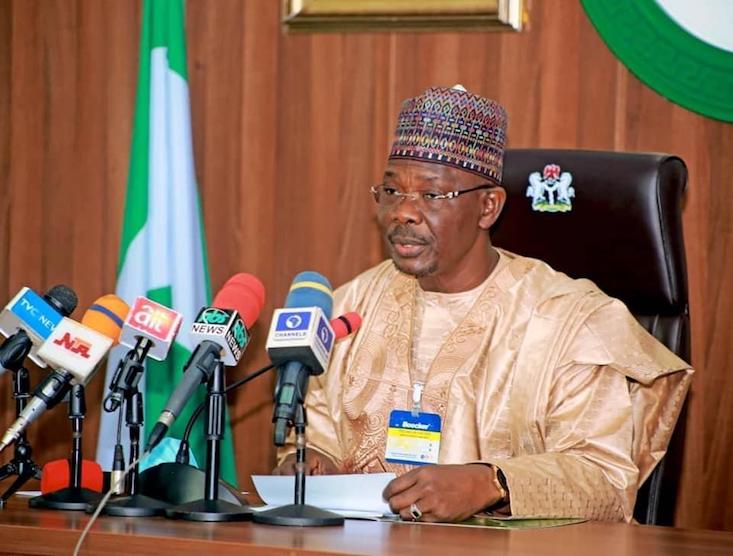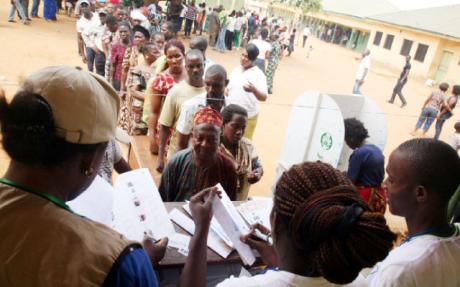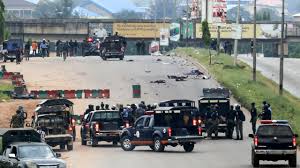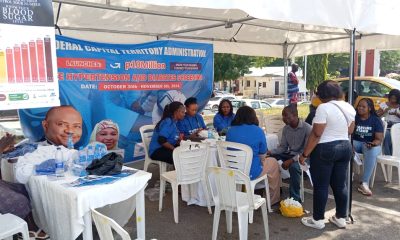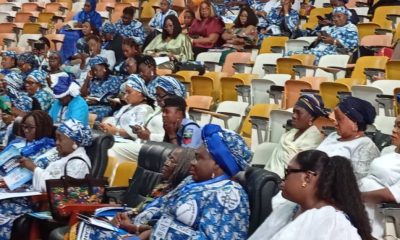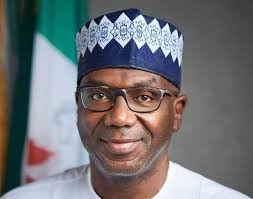Health
Residents Appeal to Nasarawa Govt to fix Dilapidated School
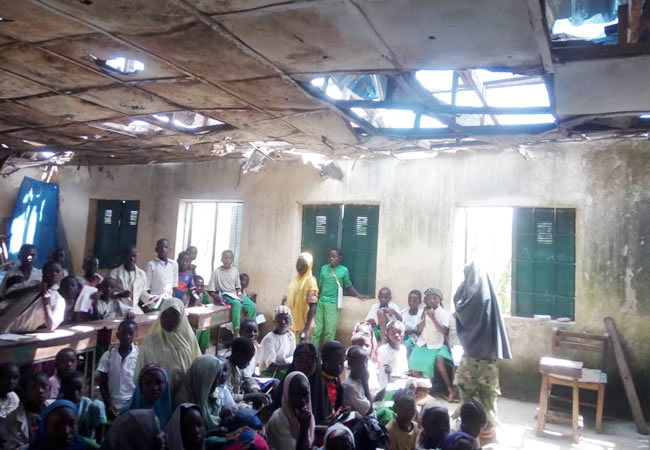
Residents of Gidan Gimba, a suburb in the Karu Local Government Area of Nasarawa, have appealed to the state government to help in fixing the only government-owned primary school in the community.
Some of the residents, who spoke to a correspondent of the News Agency of Nigeria (NAN), made the appeal on Saturday on the sideline of a joint medical outreach which took place in the community by two different foundations.
NAN reports that the foundations wich organised the medical outreach were Active World Health Foundation (AWOHF) and GreenAid Empowerment Foundation.
Mr Danjuma Audi, the chief of the community, said that there was “no presence’’ of the state government in the area in terms of the provision of basic infrastructure such as a standard school, pipe-borne water and a health facility.
According to Audi, the only government-owned Universal Basic Education Primary School in the community, which consists one block building with three classrooms, is dilapidated.
He said the community had no access to potable water, which according to him, is one of the essentials of life.
Audi appealed to the state government to come to the aid of the community.
He thanked the providers of the medical outreach for seeing to the health challenges of his people and prayed for the continued enrichment of the foundations.
Two other residents, Mrs Fibi Daniel and Mr Daniel Aruwakaka, said the community was experiencing a lot of challenges as a result of the dearth of basic infrastructure.
They both called on the state government to do the needful so that the community could partake of the dividends of democracy.
Earlier, the Founder of AWOHF, Brig.-Gen. Enang Essien (Rtd) and the President, GreenAid Foundation, Mrs Blessing Anyaoke, stated that they in Gidan Gimba to alleviate some of the sufferings of the residents.
NAN reports that no fewer than 309 persons were treated of different ailments such as high blood pressure, eye infections and malaria, among others. (NAN)
Health
WHO Identifies 17 Pathogens as Top Priorities for new Vaccine Development

The World Health Organisation (WHO) has listed 17 bacteria, viruses and parasites that regularly cause disease as top priorities for new vaccine development.WHO, in a study published on Tuesday, reconfirmed long-standing priorities for vaccine research and development (R&D), including for HIV, malaria, and tuberculosis – three diseases that collectively take nearly 2.
5 million lives yearly. The study is the first global effort to systematically prioritise endemic pathogens based on their regional and global health impact. Attention is also given to pathogens such as Group A streptococcus, which causes severe infections and contributes to 280,000 deaths from rheumatic heart disease, mainly in lower-income countries.Another new priority is Klebsiella pneumoniae — a bacteria that was associated with 790,000 deaths in 2019 and is responsible for 40 per cent of neonatal deaths due to blood infection (sepsis) in low-income countries.The new study supports the goal of ensuring that everyone, everywhere, can benefit from vaccines that protect against serious diseases.It aims to shift the focus in vaccine development away from commercial returns towards regional and global health needs, WHO’s Dr Mateusz Hasso-Agopsowicz, who works in vaccine research, said in a statement.He explained that in the past, vaccine R&D typically was influenced by profitability.“As a result, diseases that severely affect low-income regions received little attention.“We hope this represents a critical shift where we want to change the focus from commercial perspective profitability of new vaccines towards the actual health burden so that the new vaccine research and development is driven by health burden and not just commercial opportunities,” he said.To carry out the study, WHO asked international and regional experts what they think is important when prioritising pathogens for vaccines R&D.Criteria included deaths, disease and socioeconomic impact, or antimicrobial resistance.“We had asked experts that have expertise in pathogen epidemiology, clinicians, paediatricians, vaccine experts from all of the WHO regions, to ensure that the list and the results that we produce really reflect the needs of diverse populations worldwide,” Hasso-Agopsowicz said.Analysis of those preferences, combined with regional data for each pathogen, resulted in the top 10 priority pathogens for each of WHO’s six regions globally.The regional lists were then consolidated to form the global list, resulting in the 17 priority endemic pathogens for which new vaccines are urgently needed.To advance vaccine R&D, WHO has categorised each pathogen based on the stage of vaccine development and the technical challenges involved in creating effective vaccines.Hasso-Agopsowicz said the study is expected to guide future vaccine R&D investments, including funders, researchers and vaccine developers, and also policymakers as they “can decide whether to introduce these vaccines into immunisation programmes.” (NAN)Health
UCH JOHESU Suspends Strike

The Joint Health Sector Unions (JOHESU), University College Hospital (UCH), Ibadan,has suspended the strike it embarked on Oct. 25.The workers resumed work on Friday morning.The seven-day nationwide warning industrial action embarked upon by the unions was to press home their demands ofadjustment of Consolidated Health Salary Structure as was done with the Consolidated Medical Salary Structure sinceJan.
2, 2014 and implementation of consultant cadre for pharmacists in federal health institutions. Others are upward review in the retirement age from 60 to 65 years for health workers and 70 years for consultants, andpayment of outstanding salaries of JOHESU members in professional regulatory councils.The UCH JOHESU Chairman, Mr Oladayo Olabampe, said that the strike was suspended as directed by the national body.He explained that “the suspension followed an MoU signed between JOHESU national leadership and Federal Government.“The Federal Government asked for a maximum of six weeks counting from Oct. 31, to meet our demands.“Based on the MoU signed, the JOHESU National Executive Council met and resolved that the strike be suspended on Fridaynationwide.”According to him, JOHESU UCH is obeying the order, and workers have resumed work.Olabampe said that if the demands were not met after the six weeks, they would embark on an indefinite strike. (NAN)Health
Health: FCTA kick off Screening of over 250,000 Abuja Residents
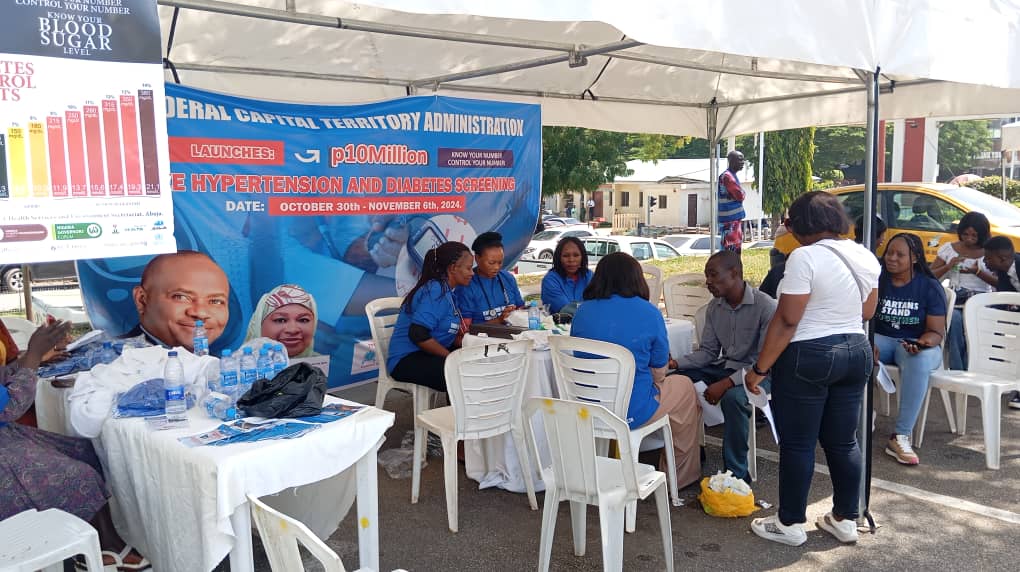
By Laide Akinboade, Abuja
The Federal Capital Territory Administration, FCTA, on Wednesday, kicked starts the screening of over 250,000 Abuja residents on diabetes and hypertension, and also do referrals.Dr Adedolapo Fasawe the Mandate secretary of Federal Capital Territory Health and Environmental Services Secretariat (FCT-HESS, while declaring the one week screening open, in Abuja.
She raised alarm at the rate at which people slump and die of high blood pressure and diabetes, adding that these unnecessary deaths can be prevented by regularly checking your sugar level and your blood pressure. She lamented that diabetes and hypertension are two silent killers and noted that, North central has one of the highest number of diabetes and hypertension. And 40% didn’t know they have hypertension until they came across a program like this.According to her, “So, this is an initiative of all commissioners for Health in Nigeria; 36 states plus the FCT. I am happy to say here in the FCT, we have had several programmes similar to this. We had a medical palliative program whereby we gave people medicines for free, for whatever their ailments is for one month. So that the money they would have used to buy medicines, they would use for other things. And we encourage the Health Insurance Scheme, whereby you pay a token, if you can afford it and your healthcare is free for the year. Or if you are considered vulnerable or poor, you are registered for free.”Now, what motivated this, we started noticing that people were slumping and dying. The rate of non-communicable diseases is going high. We were focusing a lot on HIV, malaria, and tuberculosis. But all of a sudden, people are dropping dead, and older people who were otherwise healthy in the morning would slump in the afternoon. At post-mortem, we were realising that people had undiagnosed heart diseases, which is a complication of undiagnosed hypertension. Hypertension is a very treatable disease if caught early. Diabetes is a very treatable disease if caught early. Treatable in the sense that if you adhere to your doctor’s instructions, and take your medication, you will live a normal life”.She continued, “Out of every 27 Nigerians, one person is hypertensive, this is recorded. Now, we are trying to look for all these people, educate them, and give them medication, so that your quality of life, your output at work, and in the end, the GDP of the nation would be improved. Because with this RHA, we constantly look for ways to reach the people and touch them. And the essence of this program also is that people find it hard to leave their workplace where they get money, their markets, and their farms, to go to the hospital to check. “We are taking this project 10 million to the doorstep of people, where they live, where they work, where they play. We will be in every Area council, we will be in most chiefdoms and palaces, we will be in markets, we will be in places like this where most people aggregate, and the good news is, it will run for one week. If you can’t make it today, you will make it tomorrow. And I believe at the end of this, the saying ‘health is wealth’ will truly be understood. Without good health, we cannot enjoy the beautiful infrastructure that the FCT is putting up daily”.”This program is not only for those who are suffering from hypertension or diabetes. It is also for people who we find their results to be normal. When we find their results to be normal, our screening tool has some questions; do you smoke? Do you exercise? What is your diet like, what is your lifestyle like? If the result is normal, we will encourage you and teach you how to keep it normal. That means you have been doing something good.”For people we have found to have normal readings, we encourage them and teach them how to keep it normal. They are also a very integral part of this program. It’s called health promotion. Prevention is better than cure. We can learn from them what they have been doing, we can teach them to teach their neighbours how to keep their blood pressure and blood sugar normal. And if indeed within this secretariat, we are finding normal readings, the risk factors for high blood pressure include stress, sleeplessness, obesity, family history, and sedentary lifestyle. What it then means is that most of us here, do not fall into that. If you work for Barrister Nyesom Wike, it is not likely that you have a sedentary lifestyle”.The Acting Director of the FCT Health Insurance Scheme, Dr Salma Lawal Belgore also announced that the FCT will undertake the cost of health services for a pregnant woman, Mrs Esther Omojo, until a year after the birth of her baby. She explained that the insurance will cover medical consultations, drugs, delivery and even surgery.“Our patient will benefit from medical consultation, lab investigations, her drugs, her delivery and even if she has to have surgery, it is all covered by the health insurance scheme, at no cost to her. The FCT Administration is enrolling her under the health insurance scheme, as well as all FCT residents. With the unborn baby, and a year after the baby is born, the baby is also going to be covered under the health insurance scheme, and will access medicines, medical consultations, and lab investigations at no cost to the mother or the baby”, she said.
